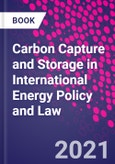Carbon Capture and Storage in International Energy Policy and Law identifies the main contemporary regulatory requirements, challenges and opportunities involving CCS from a comparative and interdisciplinary perspective. It draws on the scholarship of renowned researchers across the fields of international energy law and policy to address CCS regulation and its impact on climate change, sustainable development, and related consequences for energy transition. In this vein, the book aims to address issues related to energy, energy justice and climate changes (including CCS technology).
Contributors discuss the main challenges and advantages concerning international energy and the forms CCS may contribute to energy security, climate change, adaptation and mitigation of GHG emissions and sustainable development. In this light, the book discusses CCS as a bridge that integrates international energy, climate change and sustainable development.
Please Note: This is an On Demand product, delivery may take up to 11 working days after payment has been received.
Table of Contents
Part I. Conceptualizing International Energy Law and Carbon Capture and Storage (CCS) in Light of Climate Change
1. International Energy Law: Still a Brave New World
2. The Energy of Cooperation
3. Climate Change Mitigation and the Technological Specificities of CCS
Part II. Case Studies on CCS and related Policies, and their Consequences for Climate Change
4. The Institutional Approach of Climate Change in the multinational level: lessons from the Brazilian legislative experience
5. CCS Technologies and Efforts on Climate Change in Latin American and Caribbean Countries
6. Geologic CO2 sequestration in the USA: The allocation of property rights and policy implications involved
7. The United Kingdom's Experience in CCS Projects: The current regulatory framework and related challenges
8. Carbon Capture, Utilization and Storage in Europe: A Regulatory Review and Specific Cases
9. Australian Legislation on New Mitigation Technologies: The Case of CCS
10. Carbon Capture and Storage: Intellectual Property, Innovation Policy, and Climate Change
11. The impact of negative emissions and patent rights for climate policies
Part III: Comparative Experiences around the World
12. Who is taking Climate Change Seriously? Evidence based on a Comparative Analysis of the Carbon Capture and Storage (CCS) regulatory policies in Brazil, Canada, the European Union, and the United States
13. Reducing CO2 emissions through Carbon Capture Use and Storage in Mexico and Alberta, Canada: Addressing the legal and regulatory barriers
14. Carbon Capture, Utilization and Storage (CCUS) Legal and Regulatory Barriers in Brazil: Lessons from the European Union
15. An Overview of the existing CCS Projects in Asia: Comparing Policy Choices and their Consequences for Sustainable Development
16. Relevant aspects of Carbon Storage activities' liability in Paradigmatic Countries: Australia, Brazil, Canada, Japan, the European Union, Norway, the United Kingdom, and the United States
Part IV: The Current Picture and Future Perspectives
17. A Transitioning Model: From Oil Companies to Energy Players
18. Sustainable Development and its linkage to CCS technology: Towards an equitable energy transition
19. Why social acceptance is important for CCS projects?
20. Climate change, energy transition, and Justice: where we are now, and where are we (should be) headed?








